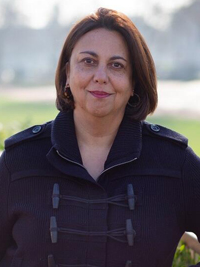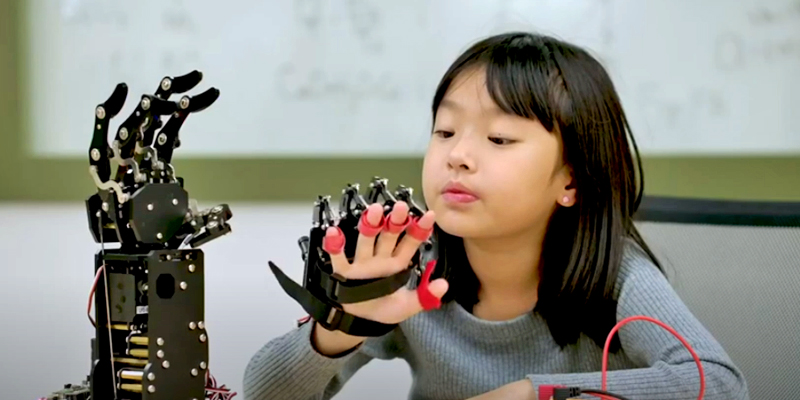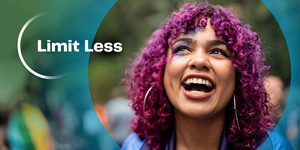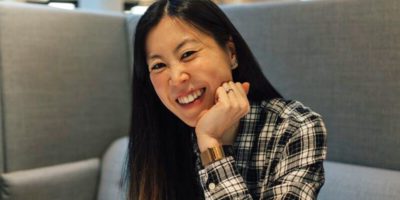Rachel Youngman is deputy chief executive of the Institute of Physics (IOP) as well as the executive lead for their Limit Less campaign, which seeks to increase the diversity of young people in the UK and Ireland continuing post-16 physics education. Rachel also leads the IOP’s international programme, with a particular focus on establishing research partnerships between the UK and Africa on climate/weather, health, AI, big data and large-scale facilities. Prior to joining the Institute, she held CEO and other leadership roles in NGOs.

“Many girls are told that physics is more suited to boys.”
Combining law with social justice…
I joined the Institute of Physics (IOP) in 2014 and was appointed deputy chief executive in 2019. That is where my introduction to physics started.
Although I studied physics at school many years ago, I was very much influenced by my parents. My dad was a lawyer and my mum was a social worker, so I set out to see how I could combine my education and career path with law and social justice.
My career has taken me to work in a senior leadership role for an international NGO that did a lot of work in commercial law and human rights. I then moved into social justice as a CEO for organisations that supported and campaigned for groups who are marginalised from society, from young people to people who are homeless. I think I have been really lucky to combine education and career with my passion.
…and ending up in physics
Some people might think that I’ve veered off into physics, but I don’t think so. Physics is in our society and has such an impact on the challenges we all face that I find myself using my experiences from outside physics every day.
IOP is the professional body and learned society for physics in the UK and Ireland, so we provide a place for physicists to share their knowledge. We are really lucky because our members come from across the physics community whether in industry, academia, the classroom, technician roles or in training programmes, as an apprentice or a student.
We also promote the benefit of physics to society. We work with partners to support and develop the teaching of physics in schools; encourage innovation, growth and productivity in business, addressing some significant skills shortages; and influence government policy across the UK and in Ireland.
Current projects
A real priority is the wellbeing of our staff team who are working from their homes and making sure they are healthy and well supported.
Some of the work I am doing with the team includes the launch of our first podcast series about future trends in society. It is always fun to do something new and for the public.
Our international work continues despite the restrictions of COVID-19, and we have been working to improve the research funding allocated to physics collaboration between UK universities and African partners. I think the whole international area is going to be really important as we emerge from the pandemic and see the economic impact globally, and of course the implications of Brexit.
Helping young people change the world
A lot of my focus at the moment is improving the diversity of young people who study physics, and this is the driving principle of our new campaign, Limit Less.
This is our first ever public-facing campaign which seeks to support young people to change the world and fulfil their potential by doing physics.
Young people are acutely aware of the unprecedented challenges that the world faces today – from coronavirus to climate change – and the impact these challenges will have on their future. At IOP, we believe that we must support their drive to change the world and improve their future, not limit or deny it.
Unfortunately, too many young people’s opportunities are being limited and this certainly includes studying physics at school. We are campaigning for more young people, especially those currently underrepresented in the physics community, to have the opportunity and be supported to study physics or begin an apprenticeship.
Removing barriers in physics
From my background of working with young people, I believe it is important that all of them deserve opportunities, and if there are barriers in the way to those opportunities, then society should work hard to remove them. I will never stop trying to be part of removing barriers because that is right for young people.
We also know that diversity of thought makes for better physics and a better contribution from physics to solving the global challenges and other problems that we as a society face. The public stereotype of a brilliant scientist working to solve big problems alone is wrong. Progress is actually being made by physicists working in teams who bring together their diverse perspectives gained from different life experiences to achieve success.
Unfortunately, some young people are put off by the misconceived ideas they are told about what physics is. Others are denied the opportunity to study physics due to the prejudice and stereotypes that they experience because of who they are.
Many girls are told that physics is more suited to boys, and many young people are told that physics is not for the likes of them based on their ethnicity, sexual orientation, disability and social background.
As a result, too many young people are made to feel that they can’t do physics, or they just don’t fit in.
This is a problem because when young people are deterred from studying physics, they are missing out on the many benefits that studying physics brings. Crucially, they are also being denied the opportunity to explore how their world works and contribute to shaping their future as informed citizens.
We all lose as a result, and through Limit Less, we are campaigning to ensure young people coming through the education system today don’t face the same barriers as those who came before.
Increasing the number of girls in physics
The campaign builds on our long-standing work to increase the number of girls who study physics. For many years, IOP’s education team has led and contributed to many important initiatives and partnerships to address underlying issues that affect gender imbalance in the uptake of physics at school.
Our new strategy recognises the multifaceted and intersectional nature of the challenges which prevent greater participation of girls in physics, which include but often go beyond structural issues of gender. This is partly why IOP is now seeking to affect change at a systemic level and reach for solutions by using a broader definition of diversity.
Through the Limit Less campaign, we are working to increase the number of young people from a range of underrepresented groups who continue with physics from age 16 and we will do this by working to influence young people in four key settings – in schools, at home, in the media and on social media.
Future steps for our campaign
This week we are meeting with Westminster parliamentarians during Evidence Week, an annual event where scientists speak to MPs and Lords about the latest advances in research and initiatives that will ensure and strengthen the UK’s position as a global leader in science.
We’ll be talking to them about the need to break down the barriers to physics that many young people face and asking them to support the Limit Less campaign.
https://www.linkedin.com/in/rachel-youngman-87a13013
https://twitter.com/rachelyoungman
https://www.facebook.com/instituteofphysics






